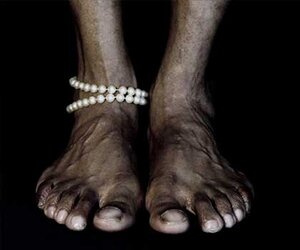Rene Pena
“I had never thought about being an artist, nor did I have any idea what that was. The first thing I did within what they call the world of art was to study music for four years at the Cartula conservatory, because I liked the violin. I wasn’t thinking about about becoming famous – I’m speaking about myself at eight or nine years old. I found out there that I wasn’t a good musician, and I dropped out.”
Rene Pena
Born in Havana in 1957, René Peña graduated from the University of Havana with a specialization in English. He took his first pictures with his family camera at the age of eight years but has never had any formal training. His work focuses on the duality between human inability to escape institutionalization and human desire for individualism. His photography is characterized by stark contrasts, between black and white, subject and background, subject and object. His need for contrast is also reflected in his place of residence: Peña currently inhabits the Cerro neighbourhood of Cuba which is home to a mostly poor African-Caribbean population, despite having been an enclave of Havana’s richest families in the 19th century.
Although sometimes compared to Robert Mapplethorpe, he cites as his influences photographers Eduardo Moñoz Ordoqui and Marta Maria Perez Bravo (both of whom focus on black-and-white photography). As of late, René Peña has been experimenting with colour photos, as well as with digital cameras.
Born in Havana in 1957, René Peña graduated from the University of Havana with a specialization in English. He took his first pictures with his family camera at the age of eight years but has never had any formal training. His work focuses on the duality between human inability to escape institutionalization and human desire for individualism. His photography is characterized by stark contrasts, between black and white, subject and background, subject and object. His need for contrast is also reflected in his place of residence: Peña currently inhabits the Cerro neighbourhood of Cuba which is home to a mostly poor African-Caribbean population, despite having been an enclave of Havana’s richest families in the 19th century.
Although sometimes compared to Robert Mapplethorpe, he cites as his influences photographers Eduardo Moñoz Ordoqui and Marta Maria Perez Bravo (both of whom focus on black-and-white photography). As of late, René Peña has been experimenting with colour photos, as well as with digital cameras.





